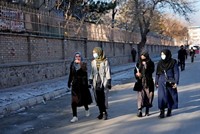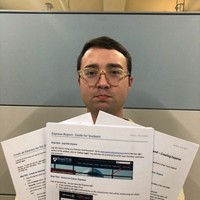Advertisement
Grab your lab coat. Let's get started
Welcome!
Welcome!
Create an account below to get 6 C&EN articles per month, receive newsletters and more - all free.
It seems this is your first time logging in online. Please enter the following information to continue.
As an ACS member you automatically get access to this site. All we need is few more details to create your reading experience.
Not you? Sign in with a different account.
Not you? Sign in with a different account.
ERROR 1
ERROR 1
ERROR 2
ERROR 2
ERROR 2
ERROR 2
ERROR 2
Password and Confirm password must match.
If you have an ACS member number, please enter it here so we can link this account to your membership. (optional)
ERROR 2
ACS values your privacy. By submitting your information, you are gaining access to C&EN and subscribing to our weekly newsletter. We use the information you provide to make your reading experience better, and we will never sell your data to third party members.
Policy
Problems With Visas
February 21, 2011
| A version of this story appeared in
Volume 89, Issue 8
Quoting President Barack Obama’s State of the Union address, Jan. 25:
“One last point about education. Today, there are hundreds of thousands of students excelling in our schools who are not American citizens. Some are the children of undocumented workers, who had nothing to do with the actions of their parents. They grew up as Americans and pledge allegiance to our flag, and yet live every day with the threat of deportation. Others come here from abroad to study in our colleges and universities. But as soon as they obtain advanced degrees, we send them back home to compete against us. It makes no sense.
“Now, I strongly believe that we should take on, once and for all, the issue of illegal immigration. I am prepared to work with Republicans and Democrats to protect our borders, enforce our laws, and address the millions of undocumented workers who are now living in the shadows. I know that debate will be difficult and take time. But tonight, let’s agree to make that effort. And let’s stop expelling talented, responsible young people who can staff our research labs, start new businesses, and further enrich this nation.”
In contrast to President Obama’s words, the red-tape procedures for issuing J-1 visas for international scholars (some from friendly countries) are unbelievably difficult. Chemists and other individuals with a “technological background” are required to go through a three- to six-week security background check every time they need to receive a visa stamp, even if it is just for renewal or extension of their visa.
As of right now, several postdoctoral researchers from MIT who are in the middle of their research had to extend their visas. Unlike other countries that allow the extension of the visa without going abroad, the U.S. requires that one return to his or her home country to renew or extend the J-1 visa. U.S. embassies treat each applicant as if he or she had never applied before. This is true even if you went through the same process just over a year ago.
International postdocs have to think long and hard before they decide to go to international conferences, job interviews, or just visit their families. This long delay, which is not always taken lightly by professors, may cause their dismissal and the end of their postdoctoral research. Also, a delay of six weeks means that your rent, bills, bank account, and more are out of your reach, and the life (although temporary) you have started to build crumbles.
Signed,
A foreign postdoc contemplating a trip to visit his family





Join the conversation
Contact the reporter
Submit a Letter to the Editor for publication
Engage with us on Twitter